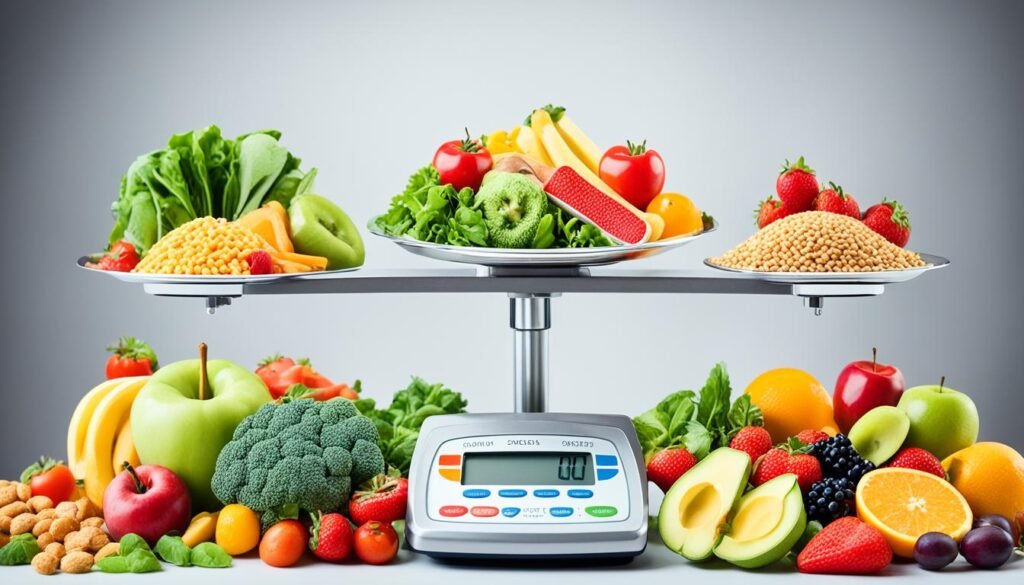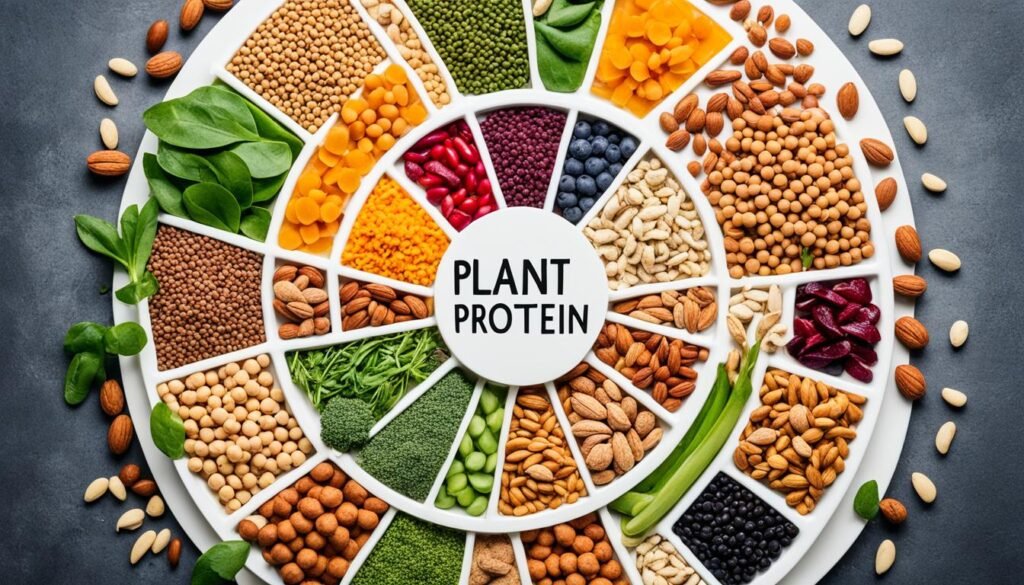Starting a plant-based lifestyle can change your life if you want to lose weight and get healthier. This guide will show you how to use plant-based diet plans to manage your weight. It’s great for beginners or those looking to improve their whole food nutrition.
You’ll learn how to eat fewer calories and balance your macronutrients. This way, you can enjoy the many benefits of a plant-based diet for long-term weight management.
Key Takeaways
- Embrace a plant-based lifestyle for sustainable weight loss and improved health
- Understand how to create a calorie deficit with nutrient-dense plant-based meals
- Discover the benefits of balancing macronutrients on a plant-based diet
- Explore nutrient-dense plant-based foods that support weight loss
- Learn time-saving meal prep strategies and healthy cooking techniques
Embracing a Plant-Based Lifestyle for Weight Management
Starting a plant-based diet can change your life for the better. It helps with weight loss and boosts your health. This guide will show you how to eat more plants for better health and weight control.
Benefits of Plant-Based Eating for Weight Loss
Eating a plant-based diet is great for losing weight in a healthy way. It focuses on whole foods and is good for your health. Here are some reasons why it’s a smart choice:
- It gives you more fiber, which makes you feel full and helps your digestion.
- Plant-based foods are lower in calories, so you can eat more without gaining weight.
- It helps your body use insulin better, which controls your blood sugar and reduces cravings.
- It has anti-inflammatory effects that can help with weight-related health problems.
Transitioning to a Whole-Food, Plant-Based Diet
Switching to a plant-based diet doesn’t mean you have to do it all at once. Start with small changes for better results. Here are some steps to help you:
- Add more plant-based foods to your meals, like greens, fruits, grains, and beans.
- Try new recipes and cooking methods to enjoy plant-based foods more.
- Cut down on processed foods, animal products, and sugars and oils.
- Plan your meals and keep healthy plant-based foods ready at home.
- Find support from others who eat plant-based to get recipes and advice.
Choosing a plant-based lifestyle is a great way to improve your health and manage your weight. It’s all about making small, lasting changes. This approach can lead to more energy and a healthier life.
Creating a Calorie Deficit with Plant-Based Meals
For sustainable weight loss, balancing calorie intake and expenditure is key. Plant-based diets require understanding your calorie needs and planning meals carefully. This helps you reach your weight loss goals.
Understanding Calorie Needs and Deficits
To lose weight, you need to eat fewer calories than you burn. Your calorie needs depend on your age, gender, activity level, and metabolism. Knowing your maintenance calorie level and eating less helps you lose weight healthily.
Calculate your calorie deficit by subtracting your desired intake from your maintenance level. Aim for a deficit of 500-1,000 calories daily for safe, steady weight loss. This approach supports your health and nutrition.
Meal Planning Strategies for a Calorie-Controlled Diet
Meal planning is crucial for a plant-based diet with a calorie deficit. Here are some strategies to consider:
- Choose nutrient-dense foods like leafy greens, vegetables, and whole grains. They give you more nutrients for fewer calories.
- Use a variety of plant-based proteins, such as beans, lentils, tofu, and tempeh. This keeps you full and satisfied.
- Add healthy fats from avocados, nuts, seeds, and oils. They support health and provide essential fatty acids.
- Practice meal prepping to have healthy meals ready. This helps avoid overeating or making poor food choices.
By planning your meals and snacks thoughtfully, you can maintain a calorie deficit. This supports your weight loss goals while keeping your diet nutritious.

| Maintenance Calorie Level | Calorie Deficit | Estimated Weekly Weight Loss |
|---|---|---|
| 2,000 calories | 1,500 calories | 1-2 pounds |
| 2,500 calories | 2,000 calories | 1-2 pounds |
| 3,000 calories | 2,500 calories | 1-2 pounds |
Creating a sustainable calorie deficit is crucial for long-term weight management. By using plant-based nutrition and mindful meal planning, you can develop healthy habits. These support your weight loss journey.
Balancing Macronutrients on a Plant-Based Diet
Starting a plant-based diet for weight loss means balancing protein, carbohydrates, and healthy fats. It’s key to meet your body’s needs for these nutrients. This balance helps you lose weight and stay healthy.
Protein: The Building Blocks of a Plant-Based Diet
Switching to a plant-based diet means finding good plant protein sources. Legumes like beans, lentils, and peas are great options. Nuts, seeds, and whole grains like quinoa and brown rice are also packed with protein.
Carbohydrates: Fueling Your Body with Whole Foods
Carbs give your body energy, and plant-based diets focus on whole, nutrient-rich carbs. Choose whole grains, starchy veggies, and fruits for energy and to help with weight loss.
Healthy Fats: The Importance of Balance
It’s key to limit bad fats but plant-based healthy fats are vital. Avocados, nuts, seeds, and olive oil are excellent sources. They help your body work well and support weight loss.
By focusing on these nutrients in your meals, you make sure your body gets what it needs. Try different plant-based proteins, carbs, and fats to find what’s best for you.
“Achieving a balanced macronutrient intake is the key to unlocking the full potential of a plant-based diet for weight loss.”
Plant-Based Diet Plans for Weight Loss
Starting a plant-based diet for weight loss means making sure you get enough protein and healthy fats. By eating a mix of plant-based proteins and healthy fats, you can lose weight and feel full and energized.
Protein Sources for Plant-Based Weight Loss
Protein helps keep your muscles strong and supports your body during weight loss. You can get plenty of protein from whole, nutrient-rich plants, such as:
- Legumes (beans, lentils, peas)
- Tofu, tempeh, and other soy-based products
- Nuts and seeds (almonds, chia, flax, pumpkin seeds)
- Whole grains (quinoa, brown rice, oats)
- Plant-based protein powders (pea, hemp, or brown rice protein)
Incorporating Healthy Fats into Your Diet
Healthy fats are key for a balanced plant-based diet for weight loss. They help you feel full, support heart health, and can even speed up your metabolism. Great sources of healthy fats include:
- Avocados
- Nuts and nut butters
- Olive oil and avocado oil
- Seeds (chia, flax, hemp)
- Coconut oil and coconut products
By eating nutrient-rich plant proteins and healthy fats, you can follow a calorie-controlled, satisfying plant-based diet. This diet will help you reach your weight loss goals.

Nutrient-Dense Plant-Based Foods for Weight Loss
Starting a weight loss journey means focusing on foods that are packed with nutrients. These foods help you reach your goals and give you important vitamins, minerals, and antioxidants. Adding a mix of whole foods to your diet helps with weight control and boosts your health.
Leafy Greens and Cruciferous Vegetables
Leafy greens and cruciferous vegetables are top choices for a healthy diet. They are full of nutrients but don’t have many calories. This makes them great for those trying to eat less but still get plenty of nutrients.
- Leafy Greens: Foods like kale, spinach, arugula, and Swiss chard are full of fiber, vitamins, and minerals. They are also low in calories, making them perfect for a diet that’s easy on calories.
- Cruciferous Vegetables: Broccoli, cauliflower, Brussels sprouts, and cabbage are in the cruciferous family. They are low in calories and have compounds that help with weight management and health.
Adding these foods to your meals and snacks can really help with weight loss. They are high in fiber and nutrients, which can make you feel full and satisfied. Their low calorie count also helps you eat less overall.
| Nutrient-Dense Plant-Based Food | Nutrient Profile | Benefits for Weight Loss |
|---|---|---|
| Kale | High in vitamins A, C, and K, as well as fiber and antioxidants | Helps promote feelings of fullness, supports healthy digestion, and provides essential nutrients |
| Broccoli | Rich in fiber, vitamins, and minerals, including folate and chromium | Aids in maintaining a calorie-controlled diet, supports healthy blood sugar levels, and provides a range of beneficial plant compounds |
| Spinach | High in vitamins A, C, and K, as well as magnesium and iron | Helps support muscle function, provides antioxidant protection, and contributes to overall nutrient density |
By choosing foods like leafy greens and cruciferous vegetables, you make sure your diet supports your weight loss goals. These foods help you eat fewer calories and get the nutrients you need for good health.
Meal Prepping and Cooking Techniques
Learning how to meal prep and cook healthy is key to losing weight on a plant-based diet. These skills make following a plant-based diet easier and more successful. They help you save time, reduce stress, and enjoy tasty, nutritious meals that help you manage your weight.
Time-Saving Meal Prep Strategies
Efficient meal prepping is crucial for a sustainable plant-based diet. Here are some tips to make meal prep faster:
- Batch cook grains, beans, and roasted veggies to use all week.
- Use reusable containers for easy meal portions and quick access.
- Wash, chop, and store veggies in the fridge for quick meals.
- Plan your meals for the week to avoid last-minute shopping.
Healthy Cooking Methods for Plant-Based Meals
Choosing the right cooking methods can keep nutrients in and make your meals taste great. Here are some healthy ways to cook:
- Roasting: High heat roasting brings out veggies’ sweetness and gives them a tasty texture.
- Steaming: Steaming keeps veggies’ vitamins and minerals intact.
- Sautéing: Sautéing quickly cooks plant-based proteins and veggies, keeping them crisp and flavorful.
- Baking: Baking is great for dishes like casseroles, frittatas, and cooking tofu or tempeh.
With these meal prepping and cooking tips, following a plant-based diet for weight loss becomes easier. You’ll enjoy tasty, healthy meals every day.
“The key to making a plant-based diet sustainable is to develop efficient meal prepping habits and master healthy cooking techniques.”
Conclusion
Starting a plant-based weight loss journey takes time and effort. By choosing a balanced, nutrient-rich plant-based diet, you can achieve lasting weight management and better health.
This guide showed the many benefits of a plant-based diet for weight loss. It helps you eat fewer calories and get more nutrients. Focus on whole foods like fruits, veggies, whole grains, and plant proteins to support your body and weight loss goals.
Success comes from finding a plant-based diet plan that fits your life and health needs. Try different recipes and meal prep methods to find what works for you. This way, you’ll enjoy eating and stick with it. Embrace this journey, celebrate your progress, and keep up with your health and well-being.
FAQ
What are the benefits of a plant-based diet for weight loss?
A plant-based diet is great for losing weight. It’s full of nutrients and fiber, making you feel full on fewer calories. It also lowers inflammation and boosts metabolic health, helping you manage your weight better.
How do I create a calorie deficit on a plant-based diet?
To lose weight on a plant-based diet, eat foods that are filling yet low in calories. Think of vegetables, fruits, whole grains, and legumes. Plan your meals and control your portions to stay within your calorie needs without feeling hungry.
What are some good plant-based protein sources for weight loss?
Great protein sources for losing weight include legumes like lentils and chickpeas, tofu, tempeh, edamame, quinoa, and nuts and seeds. These foods are not only high in protein but also packed with nutrients and fiber to support your weight loss efforts.
How do I balance macronutrients on a plant-based diet for weight loss?
For a balanced plant-based diet, mix complex carbs, healthy fats, and plant-based proteins at each meal. Eat a variety of whole, nutrient-rich plants and watch your portion sizes to meet your nutritional needs.
What are some time-saving meal prep strategies for plant-based weight loss?
Save time by cooking grains, legumes, and roasted veggies in bulk. Prepare salad greens and chopped veggies ahead. Use appliances like an Instant Pot or slow cooker to make meal prep easier. Also, cook large amounts of tofu or tempeh for protein.
How can I incorporate more nutrient-dense plant-based foods into my diet for weight loss?
To eat more nutrient-rich plant-based foods, add leafy greens, cruciferous veggies, berries, and whole grains to your meals and snacks. Try new recipes and cooking methods to make healthy eating fun and lasting.

